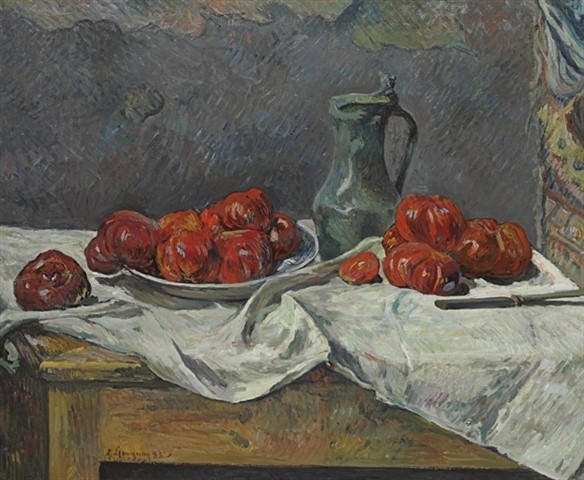Paul Gauguin
Te Arii Vahine – La Femme aux mangos (II)
oil on canvas
Painted in 1896.
Estimate: £7,000,000 - 10,000,000
Painted in 1896.
Estimate: £7,000,000 - 10,000,000
Painted in Tahiti, this is an important and extremely
rare work from the artist’s best period. Executed during Gauguin’s second and
last visit to the South Seas, Te Arii Vahine is inspired by the lush
environment that surrounded him, displaying the vivid, sensuous atmosphere and
vibrant palette that characterises his most celebrated Tahitian paintings.
Attracted by the freedom, wilderness and simplicity of this remote place,
Gauguin produced works in which the fluidity and expressiveness of the
brushstrokes reflect the sense of artistic liberation.
The work is a smaller
version of a large masterpiece of the same title – translated as The Noble
Woman or King’s Wife – now in the collection of the State Pushkin
Museum of Fine Arts in Moscow, which is currently on view in Paris at the
Fondation Louis Vuitton in the highly acclaimed exhibition of The Shchukin
Collection.
The composition also draws on the Western canon with the subject of a reclining female nude, which harks back to many precedents in European Old Master paintings. Gauguin references Christian imagery, with a nod to the tree of knowledge from the Garden of Eden and the implication that the female is a sinless, Tahitian Eve – contrasting the two worlds and their conceptions of sexuality.
Christie's 2017
A major highlight is Paul Gauguin’s Te Fare (La maison) (estimate: £12,000,000-18,000,000), one of the most richly coloured of his Tahitian landscapes, painted on his first visit to the island.
An homage to the spectacular Tahitian landscape, Te Fare (La maison) was created in 1892, the year that Paul Gauguin painted some of his greatest masterpieces. A large hibiscus tree dominates the composition, its rich emerald green leaves and just visible orange blossoms obscuring the purple-roofed house situated behind it. This wooden hut could, it has been suggested, be the artist’s own rented home in Mataiea. A quiet, enigmatic narrative seems to veil the scene, imbuing the composition with a deeper, psychological dimension, a reflection of Gauguin’s Symbolist involvement. In Te Fare (La maison) Gauguin has increasingly simplified and monumentalised the landscape, transcending reality by turning the natural world into a mystic vision of colour, line and form.
SOTHEBY’S NOVEMBER 7 & 8, 2007
Paul Gauguin’s Te Poipoi (The Morning) was one of the greatest Tahitian scenes by the
artist remaining in private hands (est. $40/60 million). For the past 62
years, the painting was part of one of the most illustrious collections ever
formed in America, that of Joan Whitney Payson. Acquired by Mrs. Payson and her
husband, Charles, in 1945, this stunning scene of an exotic paradise hung
alongside masterpieces by artists such as Vincent van Gogh, Pablo Picasso and
others, and has been consigned for sale by her family.
In Te Poipoi, Gauguin presents a highly idealized version of paradise,
untouched by western influence. This stunning canvas was painted on the
island’s southern coastal region of Mataiea in September or October 1892, about
a year into the artist’s first extended stay in French Polynesia. The title of the painting refers to the
still and quiet morning hours when the local people began their day. We can
imagine Gauguin’s voyeuristic pleasure in watching this intimate scene of women
bathing beneath a canopy of banyan and mango trees.
Te Poipoiis a refreshingly
modern and daring interpretation of the ritual of the bath, one of the most symbolically
loaded themes in the history of western art. Edgar Degas presented one of the
best well-known modern interpretations of this theme by focusing exclusively on
the bodies of his young models standing over their metal tubs. Gauguin would
have been well-acquainted with these images because he had exhibited with Degas
in 1887 atthe final Impressionist group exhibition in Paris.
When Gauguin
returned to France in August 1893, he broughtback with him over sixty canvases
and selected the best among them, including the present work, for a one-man
exhibition at Durand-Ruel. After suffering a number of visits with his
estranged family in Copenhagen and a broken leg in a street brawl in Pont Aven,
Gauguin longed to return to the South Pacific. In order to raise money for the
tripback, he sold several canvases at auction at Hôtel Drouot, including the
present work,and in June 1895 set sail for Tahiti, where he would remain for
the rest of his life.
Sotheby's 2014
Sotheby's 2014
Paul Gauguin
TAHITIENNES
LOT SOLD.
1,370,500 GBP
Paul Gauguin
BRETONNE DE PONT-AVEN DE PROFIL
LOT SOLD.
302,500 GBP
Paul Gauguin
LES MAS, ENVIRONS D'ARLES
LOT SOLD.
5,429,000 USD
Paul Gauguin
ADAM ET EVE (LE DÉPART)
LOT SOLD.
362,500 GBPPaul Gauguin
NÈGRERIES MARTINIQUE
LOT SOLD.
662,500 GBPPaul Gauguin
FEMME NUE
Lot. Vendu
27,500 GBP
Paul Gauguin
CHARETTE DE VARECH - RECTO PAYSAGE BRETON - VERSO
LOT SOLD.
33,750 GBP
Paul Gauguin
LA MAISON DU PAN-DU
LOT SOLD.
2,741,000 USD
Paul Gauguin
LA MAISON DU PENDU
LOT SOLD.
157,250 GBP
Sotheby's 2012
Paul Gauguin
CABANE SOUS LES ARBRES
LOT SOLD.
8,482,500 USD
Paul Gauguin
TÊTE DE TAHITIENNE OR LA FLEUR QUI ÉCOUTE
Lotto. Venduto
2,841,250 GBP
Nature morte aux fruits et piments
PRICE REALIZED
Le vallon
PRICE REALIZED
Te fare Hymenee (La maison des chants)
PRICE REALIZED
Paysage aux troncs bleus
PRICE REALIZED
Les dindons, Pont-Aven
PRICE REALIZED
La maison blanche
PRICE REALIZED
£1,314,500
Chaumières au flanc de la Montagne Sainte-Marguerite
PRICE REALIZED
Clovis
PRICE REALIZED
£735,650







































